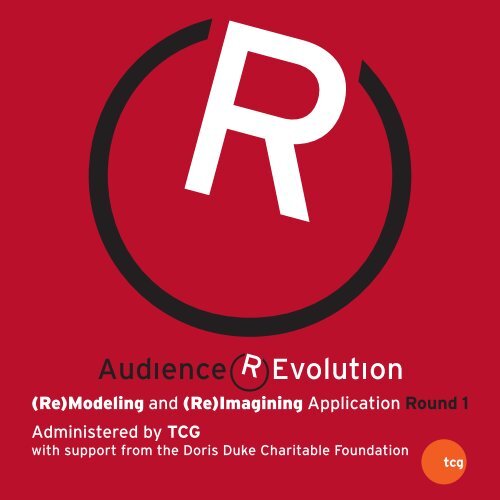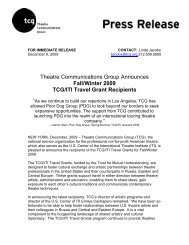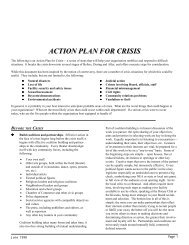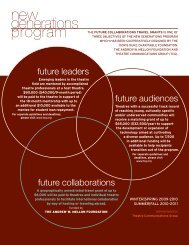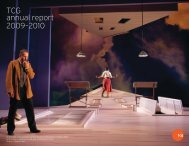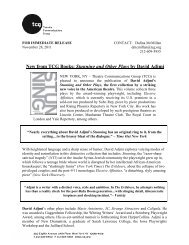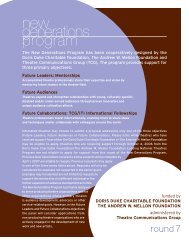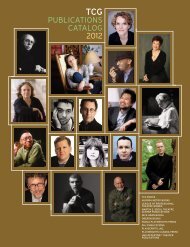Round 1 Guidelines - Theatre Communications Group
Round 1 Guidelines - Theatre Communications Group
Round 1 Guidelines - Theatre Communications Group
You also want an ePaper? Increase the reach of your titles
YUMPU automatically turns print PDFs into web optimized ePapers that Google loves.
ROUND 1 • PAGE 1<br />
(Re)Modeling and (Re)Imagining Application <strong>Round</strong> 1<br />
Administered by TCG<br />
with support from the Doris Duke Charitable Foundation<br />
tcg
Program Summary and Background<br />
Audience (R)Evolution is a four-stage program to study, promote and support successful audience engagement<br />
and community development models across the country. The first stage of the program consists of a research and<br />
assessment project, being conducted by AMS Planning & Research to determine the most impactful engagement<br />
models, and why they work. The second stage of the program was the February 2013 Learning Convening in Philadelphia<br />
where theatre professionals came together to share their own experiences and successes, and discussed how to<br />
apply these findings to their work. In the third stage of the program theatres will be awarded grants to adapt and/or<br />
reimagine successful audience engagement and community development models. The last stage of the program will be<br />
widespread dissemination, through which theatres at large will have quick and easy access to the project’s findings<br />
about how to implement effective engagement programs. These guidelines and application address the third stage of<br />
Audience (R)Evolution, allowing theatres the opportunity to (Re)Model their audience engagement and community<br />
development initiatives by adapting the successful practices of a newly identified partner organization; or (Re)Imagine<br />
their own successful initiatives to deepen and expand their reach to specific audiences/communities.<br />
TCG has long embraced the importance of audience engagement and community development efforts particularly<br />
through the New Generations Program: Future Audiences, created in 1999, which was generously supported by the<br />
Doris Duke Charitable Foundation and The Andrew W. Mellon Foundation.<br />
Since the inception of that program, US society has experienced rapid and undeniable changes—from the rise of social<br />
media to a new world economic reality. Throughout the changing times Future Audiences encouraged theatres to push<br />
boundaries while building on a track record of success.<br />
During the 11 rounds of Future Audiences TCG learned that strategies are not one-size-fits-all and that long-term<br />
relationship building is a key component of success. TCG also learned that while many theatres have had a track record of<br />
developing strong relationships with their audiences and communities, others need guidance and increased opportunities<br />
to share and access information about successful audience engagement and community development models taking<br />
place across the country. Based on these findings, TCG believes that the time is right to highlight effective models and<br />
provide an outlet for theatres to share the knowledge garnered as a result of their efforts.<br />
Audience (R)Evolution encourages theatre organizations to tap into technology, global consciousness, place-based<br />
thinking about art, the new “sense of social” and “high touch” and heightened civic engagement to develop new more<br />
relevant ways of attracting, engaging and developing specific audiences and communities.<br />
Another goal of Audience (R)Evolution is to identify and highlight successful models that can<br />
be adapted and shared widely—benefiting not only those who receive funding but also the field<br />
at large. To that end recipients will be required to share their models and lessons learned as a result<br />
of participating in the program via TCG’s website, TCG’s blog—The Circle and Conference 2.0.<br />
ROUND 1 PAGE 2<br />
Videos and transcripts from the February 2013 Audience (R)Evolution Learning Convening are<br />
available at www.tcg.org/events/ar. The plenary sessions and case studies may be a helpful resource.
Defining Audience Engagement<br />
and Community Development<br />
While there are a wide range of definitions for the terms “audience engagement” and<br />
“community development,” Audience (R)Evolution refers to the following:<br />
Audience Engagement builds opportunities for dialogue between theatres and audiences and includes a full<br />
spectrum of goals, strategies, tactics and outcomes.<br />
Community Development connects theatres and non-arts sector partners using artistic assets to build<br />
collaborative and mutually beneficial projects addressing community needs.<br />
Both utilize activities that encompass building, deepening, and listening to audiences and potential audiences<br />
to determine what is relevant to them; and serving, informing, and opening communications with them to<br />
build long-lasting relationships.<br />
Program Overview<br />
Audience (R)Evolution will provide support in two initiatives:<br />
(Re)Modeling will support TCG Member <strong>Theatre</strong>s who aim to increase their proficiency in reaching<br />
specific audience(s)/community(ies) by observing, adapting and/or implementing successful models<br />
used by newly identified partner organization(s) from the arts field or non-arts sector.<br />
(Re)Imagining will support TCG Member <strong>Theatre</strong>s with a high level of proficiency and successful track<br />
record of reaching audience(s)/community(ies) who now seek new and/or different ways to deepen or<br />
expand this work.<br />
The Audience (R)Evolution grant program will award approximately ten grants of up to $65,000<br />
each with an additional general operating support equivalent to 30% of the grant award. A minimum<br />
of 25% of Audience (R)Evolution grants will be awarded in each initiative. The remaining 50% will be<br />
awarded based on the panel’s evaluation process. Projects cannot exceed the eighteen-month period<br />
starting as early as December 1, 2013, and ending no later than March 31, 2015.<br />
Applicant Organizations in Audience (R)Evolution: (Re)Modeling<br />
may only apply to one of the two initiatives<br />
cannot also be proposed as a partner organization within the same round of the program<br />
Partner Organizations in Audience (R)Evolution: (Re)Modeling<br />
may be proposed in more than one (Re)Modeling application but will only be selected to partner<br />
with one applicant organization<br />
may submit a separate application for (Re)Imagining<br />
Applicant Organizations in Audience (R)Evolution: (Re)Imagining<br />
may only apply to one of the two initiatives<br />
may be a proposed partner in (Re)Modeling<br />
ROUND 1 PAGE 3
Program Overview (continued)<br />
This program encourages thoughtful risk-taking and experimentation and because recipients may<br />
be working in new and unfamiliar ways, the program recognizes that course adjustments may be<br />
necessary during the funding period. TCG staff will work with recipients to revise their plan, as long<br />
as the original project goals remain intact.<br />
The dissemination of lessons learned through grant supported activities is a key component of this<br />
program. TCG recognizes that evaluation tools must be hand-tailored to specific projects. However,<br />
both anecdotal and statistical approaches are required and the resulting information will be shared<br />
with the field. Posts on TCG’s blog, The Circle, and Conference 2.0 will be required from all<br />
recipients—additional information will be provided during the required orientation teleconference<br />
with project directors and TCG staff.<br />
The most competitive Audience (R)Evolution proposals will:<br />
Distinguish between efforts that are solely marketing and those which will deeply<br />
engage and develop long-lasting relationships between the organization and<br />
their audience/community<br />
Connect to the applicant organization’s mission and reference its history of<br />
programming—activities disconnected from the mission will not be competitive<br />
Demonstrate strategic thinking as well as strong commitment to, and concern<br />
for the quality of the audience and community’s experience<br />
Encourage peer-to-peer learning/training between the applicant organization and<br />
the larger theatre field<br />
Project support may take a variety of forms that include, but are not limited to, activities in artistic/<br />
programming, marketing, educational and outreach areas. Hiring new staff or supplementing hours<br />
of current staff above and beyond their current responsibilities to implement expanded programming<br />
is allowable.<br />
Funds may be used to test the adapted model or to fully implement it. Proposals that are solely<br />
researching models or feasibility studies without testing an idea or implementation will not be<br />
competitive.<br />
The project budget may only include direct expenses and the percentage of staff time dedicated<br />
to proposed activities. Overhead expenses must be supported through the general operating<br />
support component of the grant. Project funds are not meant to support organizational stability<br />
or capacity building.<br />
ROUND 1 PAGE 4
Program Description: (Re)Modeling<br />
Audience (R)Evolution: (Re)Modeling will support TCG Member <strong>Theatre</strong>s who aim to increase their proficiency<br />
in reaching specific audience(s)/community(ies) by observing, adapting and/or implementing successful models<br />
used by newly identified partner organization(s) from the arts field or non-arts sector by:<br />
identifying ways to adapt and test the proposed strategies in collaboration with the partner organization<br />
for use by the applicant organization.<br />
considering relevant strategies used in other sectors as well as within the theatre field with a clear<br />
understanding of the specific needs of their own audience and/or community.<br />
creating opportunities for objective insights by experienced peers who will examine organizational<br />
and community challenges with fresh eyes.<br />
Activities may involve observing proven strategies at the partner organization; reciprocal visits;<br />
on-site meetings with staff, board and community; and peer consulting time.<br />
Competitive applications will demonstrate:<br />
commitment throughout the applicant organization to exploring and sharing effective models for<br />
audience engagement and/or community development;<br />
involvement of key staff from multiple areas within the applicant organization (artistic, administrative,<br />
production, education, etc.) in proposed activities;<br />
rigorous thinking about the identification of the model to be adapted;<br />
appropriate match of partner organization and model to the applicant organization and its audience<br />
and/or community with a willingness to work together;<br />
relevance of the proposed model to the applicant organization’s audience engagement and/or community<br />
development goals;<br />
strong potential for long-lasting impact on the applicant organization and their specific audience and<br />
community beyond a reflection of the latest novelty or trend.<br />
Applicant organizations may identify a partner organization of any size but there should be an alignment<br />
of strategic thinking about approaches to audience engagement and community development.<br />
Applicant organizations may identify a partner organization based on commonalities which include,<br />
but are not limited to strategies (i.e. artistic, educational and marketing), organizational mission and<br />
audiences and/or communities.<br />
TCG will not match applicant organizations with partner organizations. It is the responsibility of<br />
the applicant organization to identify and communicate with potential partners prior to submitting<br />
a proposal.<br />
(Re)Modeling applications must include a partner organization narrative and supplemental materials<br />
completed by the partner organization’s contact person, agreeing to participate in the proposed project.<br />
Videos and transcripts from the February 2013 Audience (R)Evolution Learning Convening are available<br />
at www.tcg.org/events/ar. The plenary sessions and case studies may be a helpful resource.<br />
The applicant organization will allocate a minimum of 10% of grant funds to each partner organization<br />
to be observed.<br />
ROUND 1 PAGE 5
Program Description: (Re)Imagining<br />
Audience (R)Evolution: (Re)Imagining will support TCG Member <strong>Theatre</strong>s with a high level of proficiency and<br />
successful track record of reaching audience(s)/community(ies) who now seek new and/or different ways to<br />
deepen or expand this work.<br />
making substantial adjustments in their current thinking and/or strategies regarding<br />
audience engagement and/or community development.<br />
or<br />
implementing their proven strategies to serve audiences and/or communities that are<br />
newly identified by the applicant organization.<br />
Priority will be given to proposals that have the potential for high impact and positive change<br />
on the larger field as well as on the organization and their audience/community.<br />
Competitive applications will demonstrate:<br />
a track record of success in audience engagement and/or community development<br />
audience engagement and/or community development approaches which break<br />
from those already commonly practiced in the theatre field<br />
rigorous assessment of what strategies and tactics need adjustment and what changes<br />
have the most potential for positive impact<br />
the potential to be adapted widely in the field<br />
a clear methodology for assessing and reporting on the effectiveness of proposed strategies<br />
established community partnerships with individuals and/or organizations<br />
strong potential for long-lasting impact on their organization, audience/community<br />
and the larger field.<br />
ROUND 1 PAGE 6
Organizational Eligibility<br />
All applicant organizations MUST be a TCG Member <strong>Theatre</strong> in good standing at the time of application<br />
and meet the following organizational eligibility requirements for this program.<br />
Employment of at least one full-time (35 hours/week) salaried staff person at the time of application<br />
Proposed project director must be on staff at the applicant organization for a minimum of 6 months<br />
Minimum of one year prior existence as a not-for-profit professional theatre organization<br />
Applicant Organizations must submit adequate financial information documenting fiscal stability.<br />
Current audits reflecting the most recently completed fiscal year must be submitted, but 990’s<br />
will be accepted from theatres with budgets below $500,000.<br />
Timeline<br />
2013<br />
September 23, noon ET<br />
Online Application Submission<br />
week of November 18<br />
Applicant Notification<br />
Late-November 2013<br />
Recipient Orientation (teleconference)<br />
December 1<br />
Earliest start date for project activity<br />
2015<br />
May 31<br />
Latest end date for project activity<br />
ROUND 1 PAGE 7
Selection Criteria<br />
A national independent panel will review proposals using the following criteria:<br />
Audience (R)Evolution: (Re)Modeling<br />
Evidence of commitment to audience engagement<br />
and/or community development throughout the<br />
applicant organization<br />
Appropriate match of applicant organization<br />
and model to be observed<br />
Appropriate match of the applicant organization<br />
and partner organization<br />
Evidence of the partner organization’s successful<br />
audience engagement and/or community<br />
development activities<br />
Relevance of the proposed activities to the audience<br />
and/or community to be served<br />
Strong potential for long-lasting relationship between<br />
the applicant organization and their targeted audience<br />
and/or community<br />
Organizational and fiscal stability of the<br />
applicant organization<br />
Appropriateness of the project budget<br />
Potential ability of the applicant organization<br />
to change or adapt its audience engagement and/or<br />
community development strategies as a result of<br />
the program<br />
Audience (R)Evolution: (Re)Imagining<br />
Evidence of successful audience engagement and/or<br />
community development activities<br />
Evidence of commitment throughout the applicant<br />
organizations to audience engagement and/or<br />
community development<br />
Audience engagement and/or community<br />
development approaches which break from those<br />
commonly practiced throughout the theatre field<br />
Relevance of the proposed activities to the applicant<br />
organization’s audience and/or community<br />
Evidence of organization’s ability to carry out the<br />
proposed activities as described in the application<br />
Potential impact on specific audience and/or<br />
community to be served<br />
Potential impact on the field at large<br />
Organizational and fiscal stability of the applicant<br />
organization<br />
Appropriateness of the project budget<br />
Potential ability of the organization to improve its<br />
audience engagement and/or community development<br />
efforts as a result of the program<br />
ROUND 1 PAGE 8
Online Submission Instructions: (Re)Modeling<br />
APPLICATION SUBMISSION DEADLINE: September 23, 2013, noon Eastern Time<br />
1. Submit your application to<br />
www.tcg.org/grants/aud_rev/index.cfm<br />
by September 23, 2013, noon Eastern Time.<br />
You should receive a confirmation e-mail indicating<br />
a successful online submission within one hour.<br />
If not, please contact TCG immediately. Save the<br />
Submission Confirmation E-mail as proof of submission.<br />
Applicants who cannot provide proof of application<br />
submission by the deadline will not be considered.<br />
2. The online application submission form will require you<br />
to upload three (3) separate PDF files.<br />
Each file must be under 5 MB.<br />
File 1 - Please scan and upload the following documents<br />
in the order listed below and save into a single PDF<br />
file labeled: “<strong>Theatre</strong>Name_File1.pdf” (PLEASE NOTE:<br />
Applications that are missing sections may not be considered)<br />
Section 1: Applicant Organization Information (Page 1,<br />
APPLICATION FORM)<br />
Section 2: Partner Organization Information (Page 2,<br />
APPLICATION FORM)<br />
Section 3: Application Narrative (no longer than five<br />
double-spaced pages, word-processed)*<br />
Section 4: Executive Leader Statement (no longer than<br />
one page, word-processed)<br />
Section 5: Project Budget (Page 5, APPLICATION FORM)<br />
Section 6: Project Budget Narrative (Page 6,<br />
APPLICATION FORM)<br />
Section 7: Financial Information Form (Pages 7 and 8,<br />
APPLICATION FORM)<br />
Section 8: Project Director’s Bio (no longer than one<br />
page, word-processed)<br />
Section 9: Applicant Organization’s Mission and<br />
Organizational History (no longer than two pages,<br />
word-processed)<br />
Section 10: Applicant Organization’s Staff List<br />
(no longer than one page, word-processed)<br />
Section 11: Partner Organization Narrative (no longer<br />
than one page, word-processed)*<br />
Section 12: Partner Organization Contact Person’s Bio<br />
(no longer than one page, word-processed)<br />
Section 13: List of additional contacts at the Partner<br />
Organization (no longer than one page, word-processed)<br />
Section 14: Partner Organization’s Mission and<br />
Organizational History (no longer than two pages,<br />
word-processed)<br />
Section 15: Application Submission Instructions<br />
and Checklist<br />
Section 16: Signed Signatures Page<br />
File 2 - Please save the following into a separate PDF<br />
file labeled: “<strong>Theatre</strong>Name_File2.pdf”<br />
Prior Year’s Production Schedule<br />
Current Season<br />
File 3 - Please save the following into a separate PDF<br />
file labeled: “<strong>Theatre</strong>Name_File3.pdf”<br />
Audited Financial Statement or Form 990 (990s will<br />
only be accepted from theatres with budgets below<br />
$500,000.)<br />
3. Failure to assemble the application materials properly<br />
and/or failure to adhere to page limits and formatting<br />
requirements may result in your application being<br />
considered ineligible.<br />
4. Applications will NOT be accepted after the deadline<br />
and must be submitted online.<br />
5. Additional pages and material not listed<br />
on the Application Checklist will not be<br />
forwarded to the selection panel.<br />
*Formatting Requirements: You must use 11-point Times New Roman font and have 1'' margins. With the exception of the<br />
signed APPLICATION FORM, each page should include a header in the upper-right-hand corner stating the applicant’s name<br />
and page number. In the narrative sections you must type each question and answer directly below the corresponding question.<br />
Applications that are incomplete, or that do not meet the requirements mentioned above will be considered ineligible.<br />
ROUND 1 PAGE 9
Online Submission Instructions: (Re)Imagining<br />
APPLICATION SUBMISSION DEADLINE: September 23, 2013, noon Eastern Time<br />
1. Submit your application to<br />
www.tcg.org/grants/aud_rev/index.cfm<br />
by September 23, 2013, noon Eastern Time.<br />
You should receive a confirmation e-mail indicating<br />
a successful online submission within one hour.<br />
If not, please contact TCG immediately. Save the<br />
Submission Confirmation E-mail as proof of submission.<br />
Applicants who cannot provide proof of application<br />
submission by the deadline will not be considered.<br />
2. The online application submission form will require you<br />
to upload three (3) separate PDF files.<br />
Each file must be under 5 MB.<br />
File 1 - Please scan and upload the following documents<br />
in the order listed below and save into a single PDF<br />
file labeled: “<strong>Theatre</strong>Name_File1.pdf”<br />
(PLEASE NOTE: Applications that are missing sections<br />
may not be considered)<br />
Section 1: Applicant Organization Information (Page 1,<br />
APPLICATION FORM)<br />
Section 2: Application Narrative (no longer than five<br />
double-spaced pages, word-processed)*<br />
Section 3: Executive Leader Statement (no longer than<br />
one page, word-processed)<br />
Section 4: Project Budget (Page 4, APPLICATION FORM)<br />
Section 5: Project Budget Narrative (Page 5,<br />
APPLICATION FORM)<br />
Section 6: Financial Information Form (Pages 6 and 7,<br />
(APPLICATION FORM)<br />
Section 7: Project Director’s Bio (no longer than one<br />
page, word-processed)<br />
Section 8: Applicant Organization’s Mission and<br />
organizational History (no longer than two pages,<br />
word-processed)<br />
Section 9: Applicant Organization’s Staff List<br />
(no longer than one page, word-processed)<br />
Section 10: Application Submission Instructions<br />
and Checklist<br />
Section 11: Signed Signatures Page<br />
File 2 - Please save the following into a separate PDF<br />
file labeled: “<strong>Theatre</strong>Name_File2.pdf”<br />
Prior Year’s Production Schedule<br />
Current Season<br />
File 3 - Please save the following into a separate PDF<br />
file labeled: “<strong>Theatre</strong>Name_File3.pdf”<br />
Audited Financial Statement or Form 990 (990s will<br />
only be accepted from theatres with budgets below<br />
$500,000.)<br />
3. Failure to assemble the application materials properly<br />
and/or failure to adhere to page limits and formatting<br />
requirements may result in your application being<br />
considered ineligible.<br />
4. Applications will NOT be accepted after the deadline<br />
and must be submitted online.<br />
5. Additional pages and material not listed<br />
on the Application Checklist will not be<br />
forwarded to the selection panel.<br />
ROUND 1 PAGE 10<br />
*Formatting Requirements: You must use 11-point Times New Roman font and have 1'' margins. With the exception of the<br />
signed APPLICATION FORM, each page should include a header in the upper-right-hand corner stating the applicant’s name<br />
and page number. In the narrative sections you must type each question and answer directly below the corresponding question.<br />
Applications that are incomplete, or that do not meet the requirements mentioned above will be considered ineligible.
The mission of the Doris Duke Charitable Foundation is to improve the<br />
quality of people’s lives through grants supporting the performing arts,<br />
environmental conservation, medical research and the prevention of child<br />
abuse, and through preservation of the cultural and environmental legacy<br />
of Doris Duke’s properties. www.ddcf.org<br />
tcg<br />
For over 50 years, <strong>Theatre</strong> <strong>Communications</strong> <strong>Group</strong> (TCG), the national<br />
organization for theatre, has existed to strengthen, nurture and promote<br />
the professional not-for-profit American theatre. In all of its endeavors,<br />
TCG seeks to increase the organizational efficiency of its member theatres,<br />
cultivate and celebrate the artistic talent and achievements of the field<br />
and promote a larger public understanding of, and appreciation for, the<br />
theatre. TCG is a 501(c)(3) not-for-profit organization. www.tcg.org


